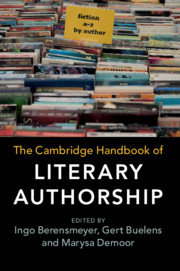Book contents
- The Cambridge Handbook of Literary Authorship
- The Cambridge Handbook of Literary Authorship
- Copyright page
- Contents
- Figures
- Contributors
- Acknowledgments
- Abbreviations
- Chapter 1 Introduction
- Part I Historical Perspectives
- Chapter 2 Authorship in Cuneiform Literature
- Chapter 3 Authorship in Ancient Egypt
- Chapter 4 Authorship in Archaic and Classical Greece
- Chapter 5 Authorship in Classical Rome
- Chapter 6 Conceptions of Authorship in Early Jewish Cultures
- Chapter 7 Modes of Authorship and the Making of Medieval English Literature
- Chapter 8 Manuscript and Print Cultures 1500–1700
- Chapter 9 The Eighteenth Century
- Chapter 10 The Nineteenth Century
- Chapter 11 Industrialized Print
- Chapter 12 Postmodernist Authorship
- Chapter 13 Chinese Authorship
- Chapter 14 Literary Authorship in the Digital Age
- Part II Systematic Perspectives
- Part III Practical Perspectives
- Select Bibliography
- Index
Chapter 5 - Authorship in Classical Rome
from Part I - Historical Perspectives
Published online by Cambridge University Press: 07 June 2019
- The Cambridge Handbook of Literary Authorship
- The Cambridge Handbook of Literary Authorship
- Copyright page
- Contents
- Figures
- Contributors
- Acknowledgments
- Abbreviations
- Chapter 1 Introduction
- Part I Historical Perspectives
- Chapter 2 Authorship in Cuneiform Literature
- Chapter 3 Authorship in Ancient Egypt
- Chapter 4 Authorship in Archaic and Classical Greece
- Chapter 5 Authorship in Classical Rome
- Chapter 6 Conceptions of Authorship in Early Jewish Cultures
- Chapter 7 Modes of Authorship and the Making of Medieval English Literature
- Chapter 8 Manuscript and Print Cultures 1500–1700
- Chapter 9 The Eighteenth Century
- Chapter 10 The Nineteenth Century
- Chapter 11 Industrialized Print
- Chapter 12 Postmodernist Authorship
- Chapter 13 Chinese Authorship
- Chapter 14 Literary Authorship in the Digital Age
- Part II Systematic Perspectives
- Part III Practical Perspectives
- Select Bibliography
- Index
Summary
Even though the modern term “author” is derived from the Latin auctor, histories of authorship usually assume a paradigm shift from premodernity to the modern age, with the invention of printing with movable type as a major historical caesura. Yet they also set out from certain author concepts that rely on central premises concerning copyright: notably, the premise that, within a so-called premodern society less concerned with individuality, notions of property were unknown or at least insignificant; and that the entire theoretical baggage that has accrued around authorship in modern times was “naturally” unknown in antiquity and, hence, irrelevant. Two complementary prejudices take effect here: that art and life were supposedly not thought of as distinct before modernity, and that unity and identity, instead of rupture and change, dominated an author’s self-image and his or her works. But ancient thinkers were surely able to distinguish between art and life, with the emphasis on a conscious blending of the two rather than their prior unity.
- Type
- Chapter
- Information
- The Cambridge Handbook of Literary Authorship , pp. 64 - 80Publisher: Cambridge University PressPrint publication year: 2019



